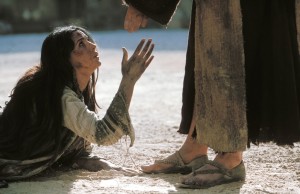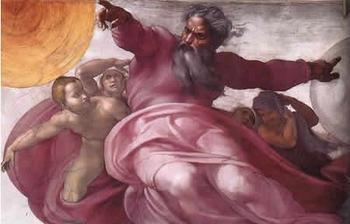A few nights ago I was talking with my incredibly smart and beautiful wife about the violence of God in Scripture and how we can interpret both in light of Jesus Christ, and we realized that in some ways, Christianity has fallen into the same trap that Judaism fell into so many years ago.
 Before Jesus came (and in fact, even today) when Jewish people read their Hebrew Scriptures and saw a violent God doing violent things, they projected this onto their expectations for what the Messiah would be and do when He finally came. They saw a violent God, and so were looking for a violent Messiah. They wanted a Messiah who would throw off Roman rule, would slay the enemies, kill the wicked, and banish all the unrighteous into eternal pits of darkness and gloom.
Before Jesus came (and in fact, even today) when Jewish people read their Hebrew Scriptures and saw a violent God doing violent things, they projected this onto their expectations for what the Messiah would be and do when He finally came. They saw a violent God, and so were looking for a violent Messiah. They wanted a Messiah who would throw off Roman rule, would slay the enemies, kill the wicked, and banish all the unrighteous into eternal pits of darkness and gloom.
This was partly why the Jewish religious leaders rejected Jesus as the Messiah. He did not fit the bill! He did not live up to their expectations. He did not match what they read in the Bible. He did not fulfill the expectations, promises, and prophecies of what the Messiah would do when He came. And in fact, on numerous occasions, Jesus flat-out told them that the reason He was not doing these things is because they had misread and misinterpreted their Scriptures.
Hmmm…. now take those two paragraphs and substitute in what Christians think about the second coming of Jesus….
By an amazing twist of hermeneutical skill, we Christians have learned to nod our heads at both Jewish and Christian interpretations of Scripture.
We say, “The Jewish interpretation and understanding of God was correct. They just got the timing all wrong. God is violent and bloody, and so is the Messiah. But Jesus didn’t come the first time to kill all the sinners; He will do that when He comes again. Maranatha! Come, Lord Jesus! Let the bloodbath begin!”




 So I went and looked it up.
So I went and looked it up.
 The final piece of the puzzle about how to understand the violence of God in the Old Testament in light of life, ministry, and death of Jesus Christ is found in 2 Corinthians 5:21.
The final piece of the puzzle about how to understand the violence of God in the Old Testament in light of life, ministry, and death of Jesus Christ is found in 2 Corinthians 5:21. I could tell by the way Jesus twitched and squirmed that the ants were not just climbing over His body, but were biting Him as well. I was surprised that Jesus did not cry out in pain, but I knew that if He did, they would enter His mouth and eat Him alive from the inside out. As soon as I had this horrifying thought, Jesus looked me in the eyes and then opened His mouth wide. As expected, the mass of ants swarmed in and they ate Jesus alive. Soon, there was nothing left of Jesus, only a black mass of ants.
I could tell by the way Jesus twitched and squirmed that the ants were not just climbing over His body, but were biting Him as well. I was surprised that Jesus did not cry out in pain, but I knew that if He did, they would enter His mouth and eat Him alive from the inside out. As soon as I had this horrifying thought, Jesus looked me in the eyes and then opened His mouth wide. As expected, the mass of ants swarmed in and they ate Jesus alive. Soon, there was nothing left of Jesus, only a black mass of ants. How can a God who says "Love your enemies" (Matthew 5:44) be the same God who instructs His people in the Old Testament to kill their enemies?
How can a God who says "Love your enemies" (Matthew 5:44) be the same God who instructs His people in the Old Testament to kill their enemies?

 In response to a great question from
In response to a great question from 
 First, note that both texts seem to refer to something that happens to people after they die. I don’t know what sorts of “punishment” God might have in store for people after death, but again, using Jesus as the guiding principle, I highly doubt that God is going to torture people for all eternity by burning them in fire. I do not believe in annihilationism, nor do I believe in universalism, but I also do not believe in eternal conscious torment.
First, note that both texts seem to refer to something that happens to people after they die. I don’t know what sorts of “punishment” God might have in store for people after death, but again, using Jesus as the guiding principle, I highly doubt that God is going to torture people for all eternity by burning them in fire. I do not believe in annihilationism, nor do I believe in universalism, but I also do not believe in eternal conscious torment.
 In Christian circles, we often hear a lot about three topics: Sin, death, and resurrection.
In Christian circles, we often hear a lot about three topics: Sin, death, and resurrection. For example, in some translations of Exodus 20:5, it says that God punishes children for the iniquity of their parents. This sounds terribly unjust. Why should children get punished for something their parents did? But if we understand the Hebrew terms used here and in other similar references as “discipline” or “judgment” we can begin to make a little more sense of these passages. My preference is “judgment.”
For example, in some translations of Exodus 20:5, it says that God punishes children for the iniquity of their parents. This sounds terribly unjust. Why should children get punished for something their parents did? But if we understand the Hebrew terms used here and in other similar references as “discipline” or “judgment” we can begin to make a little more sense of these passages. My preference is “judgment.”